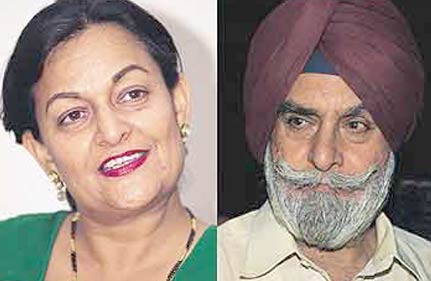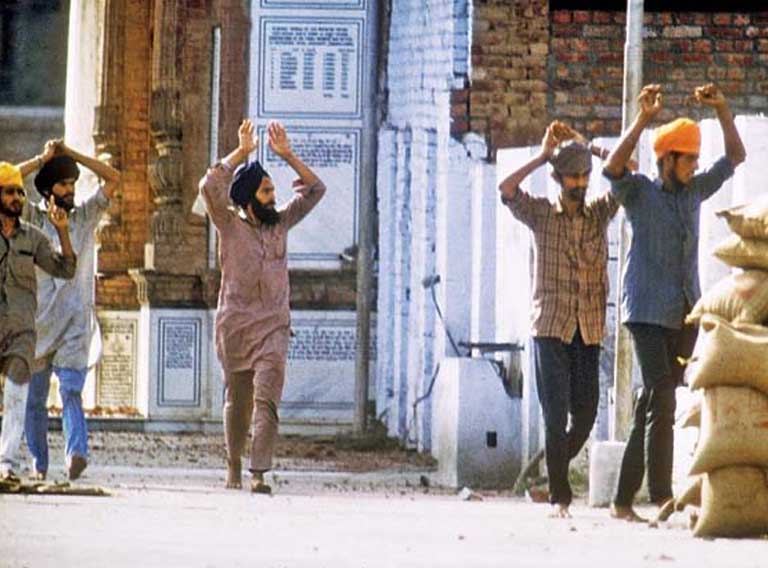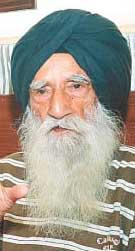“Sikhs are only reacting to state terrorism”
Justice Ajit Singh Bains, the chairperson of the Punjab Human Rights Organisation (PHRO) and a former judge of the Punjab and Haryana High Court talks about the lack of human rights awareness and activity in Punjab and takes down the communist parties -left, down and centre, for their being hand in glove with the perpetrators of state terrorism and their deafening silence on the atrocities in Punjab. Addressing a public meeting organised by the Bombay unit of the People’s Union for Civil Liberties and while talking to the media in Mumbai, without mincing words, the late iconic voice for human rights called the then Punjab “a police state with more than 10,000 people in jail.”
![Justice Ajit Singh Bains, the chairperson of the Punjab Human Rights Organisation (PHRO) and a former judge of the Punjab and Haryana High Court talks about the lack of human rights awareness and activity in Punjab and takes down the communist parties -left, down and centre, for their being hand in glove with the perpetrators of state terrorism and their deafening silence on the atrocities in Punjab. Addressing a public meeting organised by the Bombay unit of the People’s Union […]](https://www.theworldsikhnews.com/wp-content/uploads/2022/02/State-Terrorism-in-Punjab-360x266.jpeg)
THERE IS NO RULE OF LAW IN PUNJAB. IT HAS BEEN TURNED INTO A POLICE STATE. More than 10,000 persons are in jail. The Golden Temple is under siege for the last five years. Punjab is cut off from the rest of the world. No foreign journalists, human rights activists, legislators are allowed to enter Punjab, except on special visas. Even Punjabis living abroad have to get a special visa to enter the state. The whole state is under siege,” he said at a press conference arranged in Bombay last week by the Bombay Union of Journalists.
Justice Ajit Singh Bains said that terrorism unleashed by the state had alienated the Sikhs in Punjab and hence though they did not support terrorism by militant groups, they did not cooperate with the police in ending it either.
 In reply to a question, he said though the Communist Party of India and the Communist Party-Marxist oppose “private” terrorism, they never talked of state terrorism. They had even opposed the suggestion of transferring Police Director General KPS Gill after the Rupan Deol Bajaj episode involving moral turpitude. Hence they were failing to carry the people with them.
In reply to a question, he said though the Communist Party of India and the Communist Party-Marxist oppose “private” terrorism, they never talked of state terrorism. They had even opposed the suggestion of transferring Police Director General KPS Gill after the Rupan Deol Bajaj episode involving moral turpitude. Hence they were failing to carry the people with them.
 Contrary to media reports, law and order had deteriorated after Operation Black Thunder, he said. Neither Operation Black Thunder, nor Operation Woodrose (in which the countryside of Punjab was combed) nor Operation Bluestar had helped.
Contrary to media reports, law and order had deteriorated after Operation Black Thunder, he said. Neither Operation Black Thunder, nor Operation Woodrose (in which the countryside of Punjab was combed) nor Operation Bluestar had helped.
Justice Bains said that after he studied the history of the Golden Temple, he realised why Operation Bluestar had hurt the Sikhs so much. The temple, he said, had always been the focus of the struggle against tyranny. As recently as during the Emergency, Akalis used to court arrest in batches which started from the temple.
The Golden Temple had always been the focus of the struggle against tyranny.
During the Raj, he said, the struggle to liberate gurdwaras from British control had been seen by Gandhi and Nehru as a battle for freedom. “The government of India should have therefore thought many times before invading it,” he said.
Justice Bains had headed a four-member committee set up by the Barnala government, which investigated police “encounters” in 1985, Finding most of these to be fake, they had unanimously recommended that a judicial commission go into them, and also asked Amnesty International to investigate the matter. Neither recommendation was followed. Amnesty was refused permission to enter India by the Centre in 1987.
The PHRO had Hindus as well as Muslim members in it, mostly advocates and journalists. Its vice president, journalist Sukhdev Singh, had been arrested under the Terrorism and Disruptive Act (TADA) for six months. Several of the advocates had also been arrested, he said.
Addressing a public meeting organised by the Bombay unit of the People’s Union for Civil Liberties, Justice Bains likened the TADA to the types of legislation enacted by regimes such as the one in South Africa. Torture coupled with the extrajudicial killing of suspects were common in Punjab, he said.
Justice Bains had headed a four-member committee set up by the Barnala government, which investigated police “encounters” in 1985, Finding most of these to be fake, they had unanimously recommended that a judicial commission go into them, and also asked Amnesty International to investigate the matter. Neither recommendation was followed. Amnesty was refused permission to enter India by the Centre in 1987.
Outlining what he saw as the pernicious features of the Act, the retired judge said offences under TADA fall outside the high court’s jurisdiction, and can only be tried by special courts.
Unlike under the Indian Penal Code or the Criminal Procedure Code, suspects held under the TADA are deemed guilty until proved innocent. The burden of proving innocence lies with the suspect.
The Act disallows bail except in cases where the suspect’s innocence is proved. Trials are held in-camera and the identity of state witnesses is withheld from the accused. It also provides for the confiscation of the property after conviction.
“There is no rule of law in Punjab, no human rights; everything is in the hands of the police.”
This article was first published in The Spokesman Weekly, published from New Delhi on 2nd January 1989. This article has been retrieved from the archives of the Panjab Digital Library.
Justice Bains scathingly attacked the central government which he squarely blamed for the current crisis in Punjab. A form of state-sponsored terrorism was unleashed in the region, he said. “There is no rule of law in Punjab, no human rights; everything is in the hands of the police.”
The killing of innocent people by the police had driven young men to take up arms, Bains said. “Sikhs are only reacting to state terrorism. The government has employed criminals to deal with terrorism,” he said.
He blamed `”goonda elements” organised by Congress-I workers for the November 1984 carnage, and “lumpen elements” aided by the local police for the death of 6 Sikh students at Bidar earlier this year.
The killing of innocent people by the police had driven young men to take up arms, Bains said. “Sikhs are only reacting to state terrorism. The government has employed criminals to deal with terrorism.
Accusing the government media of portraying Sikhs as separatists, Bains asserted that the Sikh community was opposed to the secession of Punjab. Barring some militant organisations, no Sikh organisation had demanded a separate state, he maintained. “If Sikhs wanted a separate state, they would have demanded it in 1946-47.”
Bains charged that the government was trying to exploit Hindu sentiments by putting a communal hue to the violence in Punjab. He denied that there was any Hindu-Sikh rivalry in the state.
![]()
On the occasion, the PUCL passed a resolution calling upon President R Venkatararnan to commute the death sentence awarded to Kehar Singh, convicted in the Indira Gandhi assassination case.
 Justice Ajit Singh Bains passed away on 11 February 2022. He was a human rights champion throughout his life.
Justice Ajit Singh Bains passed away on 11 February 2022. He was a human rights champion throughout his life.

One thought on ““Sikhs are only reacting to state terrorism””